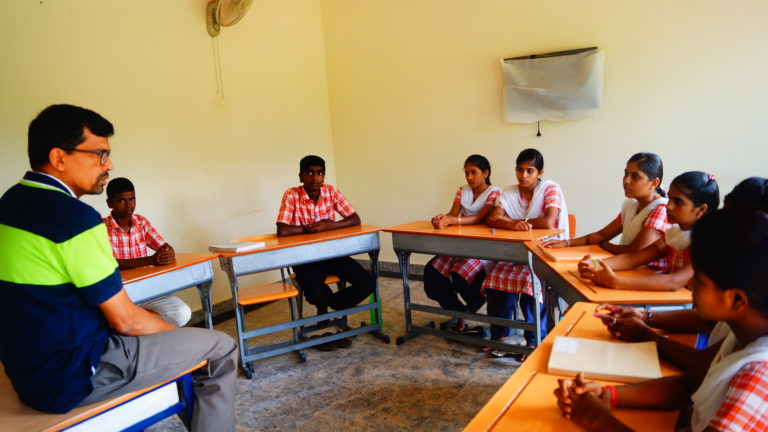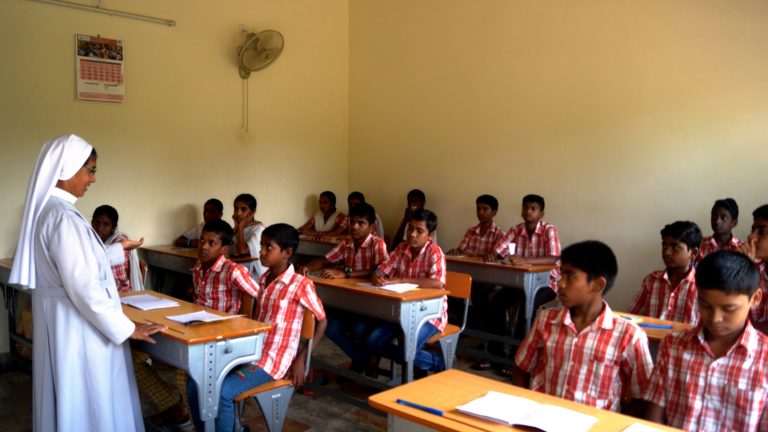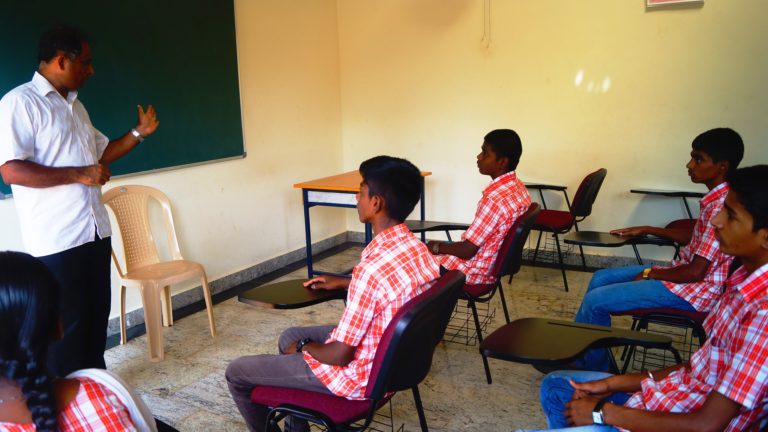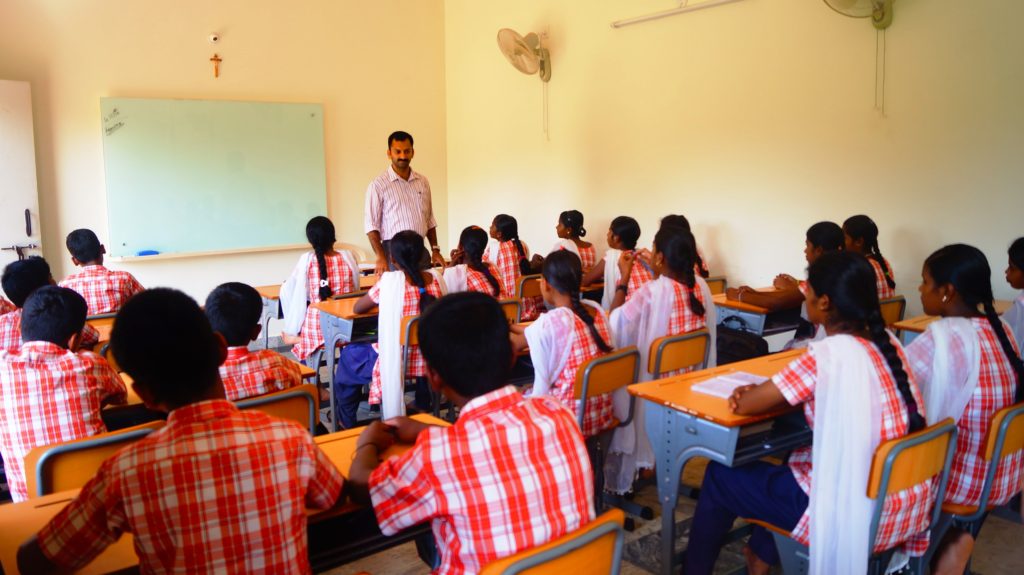



Snehagram provides residential schooling for adolescent children. The children will be given special learning assistance for completing their secondary and higher secondary level of education under the National Open School ( NIOS) system. Under this program each child can choose a subject according to his or her aptitude and orientation for future job placement. The scholastic performance of each child will be kept under close watch and necessary correctional actions will be made during their schooling. The children will be guided and facilitated to enjoy learning rather than feeling it as a burden. There will be teachers for giving professional teaching assistance to children.
Snehagram Academic Program
Snehagram is the second phase of Sneha Care Home. It is a residential program for boys and girls who are 13 years and above with a focus on vocational training and rehabilitation. It has the facility to offer residential tainting of 200 children, both boys and girls; Snehagram facilitates a preparatory platform for the adolescent CLHIV to enable themselves to face the challenges of life when they reach their adulthood.
The unique model is evolved to meet the long term needs of childhood development adolescent issues, personality development, value development, employment, family and community acceptance.
“Learn for life” is the motto of Snehagram. The curriculum is not only based on theory as well as practical too. We follow the National Institute of Open School (NIOS) syllabus at secondary (10th) and senior secondary (12th).
Our children are divided into five groups and they are,
1. Pre – NIOS (9th): These students are new to Snehagram and will attend NIOS secondary level (10th) examination on coming academic year.
2. NIOS (10th): Students those who attend their secondary level examination (10th) in the current academic year.
3. Post NIOS (11th): Students who completed their secondary examination on previous academic year.
4. PU (12th): Students those who attend their Senior Secondary examination (PU) for the current academic year.
5. Post PU: Those who completed Senior Secondary and most of them are doing their graduation in different open universities.
Curriculum
9th Standard (Pre-NIOS)
These students do not have a public examination. We concentrate on their English language skills. Subjects are divided into English Stories, Moral Science, Moral Education, English Grammar and Video – (show them different short videos about general topics, students note down the points, write and present the same). Through these subjects they improve their language skill and confidence. These skills would help them to understand the subject which will be there in their secondary class next year.
10th and 12th (Secondary and Senior Secondary)
These students are doing their formal studies and follow NIOS syllabus. We divided the academic year of these groups into three modules.
Module 1: From June to September:
First four months, we follow only their textbooks and complete the portions. End of September, will be a formal examination with the help of previous year question paper. Which help the students to identify their current status, the mistakes they committed in these examinations, the area they are weak and strong. Based on this evaluation we can plan individual care.
Module 2: From October to December:
Secondary students are divided into four groups based on their performance in September examination and the groups are named Green, Blue, Orange and Red. We use four different class rooms for different group and the rooms are named Reading, Writing, Public Speaking and New Words. Secondary students are undergoing through these training and the training is conducted by senior secondary students as four different groups. These four senior secondary groups are coordinated by the academic coordinator and the four secondary groups who are undergoing the training are coordinated by senior group (Post PU). Each group of secondary students gets one period (45min), training in each aspect. Students groups move to different class room as per the time table.
Secondary syllabus divided into four categories:
1. Reading – Daily a new short story will be written on the board at Reading room. Student of a particular group as per the timetable, write down the story in their note book and one by one read in front of the same group. Students will be corrected about their posture, clarity of voice, fluency, modulation and the style of reading.
2. Writing – Daily a new general topic would provided at writing room. Students of a particular group as per their time table, write down topic and write the same topic in 4 sentences, 8 sentences and 12 to 15 sentences, which, help the student to write the answers to the question as per the mark.
3. Public Speaking – The topic, which they wrote on previous day at their writing class, will be presented on the current day speaking. The presentation will be recorded. Once, all the students of the group completed their presentation it will be played on screen in the same period. Students themselves can identify the positive and negative points. The comments from other students also help them to improve their confidence, posture, body movement, hand movements, eye contacts, clarity, language, flow etc.
4. New Words – Every day five new words with meaning and examples. These words are simple and can be used in our daily life. These words of the day are written on the board of the room New Words. Senior secondary students are there to explain to the groups. Within the same period students copy and learn these words with meaning and usages, which help the students to improve their vocabulary and improve the standard of their language.
Module 3: January to April
In this module is fully concentrated to the NIOS syllabus for public examinations of secondary and senior secondary. Revision of subjects, examination with previous year question papers, correction of common and repeating mistakes etc. are the main activities in this period. At the end of this module all the students would be confident enough to attend their public examination.
11th Standard (Post NIOS)
These students have completed their secondary examination and will do senior secondary in following year. This group is mainly concentrated in vocational training like Poultry Farm, Dairy Farm, Organic Farming and class room training like public speaking, moral education, stories, essay writing etc. The training for the year would help the students to improve their skills and aware about their ability.
Post 12th
Numbers of students are very less in this group. Most of them are doing their graduation in different combination from different open universities like IGNOU, Annamalai Open University etc. This group would help in educational and co curricular activities of Snehagram.
Co Curricular Activities
Educations of the students are supported with different co curricular activities such as Elocution, debates, quiz, news reading etc. Every day evening after supper one of the students read the news of the day. The news is prepared by a student who is pre assigned. The news reading includes two international, national, local and sports. The student who read the news, need to explain the news after reading it.
After reading, the news will be displayed at the knowledge corner for their reference. Every week is assigned to a particular state or region of India. Maximum information of this state would be prepared and displayed in the knowledge corner and a particular event or specialty of the week, if any, would also be displayed. Every Friday afternoon, a quiz competition is conducted by post 12th students. The questions are based on the information learned during that week.
Total Number of students at Snehagram 2018-2019
| 9th Standard | 10th Standard | 11th Standard | 12th Standard | Graduation | |||||
|---|---|---|---|---|---|---|---|---|---|
| Boys | Girls | Boys | Girls | Boys | Girls | Boys | Girls | Boys | Girls |
| 12 | 7 | 12 | 16 | 7 | 2 | 3 | 6 | 5 | 2 |
| Total | 19 | 28 | 9 | 9 | 7 | ||||
| Total | 72 |
